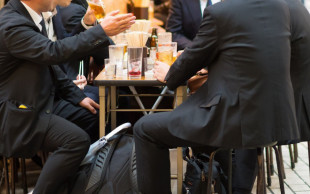STYLEGUIDE talks to Terrence from Ghetto Fitness on his experiences in the fighting ring as a Muay Thai champion. To date, his many accolades include being the Johor Muay Thai Champion in 2015 and 2016, the World Association of Kickboxing Association (WAKO) Singapore Champion in 2015, and the WAKO Oceania Champion in 2017.
STYLEGUIDE: How did you get started as a professional fighter?
Terrence: I started with martial arts when I was already 20 years old - that’s considered quite late in life in the fighting ring actually. So I’m currently 26 years old, and I’ve been in this circle for about six years.
The way I started was through getting involved in a so-called ‘weight-loss’ exercise program for myself when I was younger because I was quite huge. But that got boring after a while, because most of the time you end up doing the exact same things – it’s either skipping or punching and you don’t really see yourself progressing any further after that.
I got involved in martial arts because I saw some people sparring in the ring at the gym that I was at. They were throwing some really nice moves, like clinches and movements that could cause their opponents to trip and fall.
It made me want to learn something new, to implement in my daily life.
I went ahead to ask if they were a fighters’ team of some sorts, and what I could do to get myself up there with them. They explained that I’d have to come to the gym on a regular basis, like three to four times a week – and so I just did it, and six months later I found myself representing the fight gym (Fight Works Asia).
From there, I fought my first fight and I won a gold medal for Sanda (a form of martial arts that’s like kickboxing, but you are allowed to throw someone down with a different set of rules) and they actually invited all of the Muay Thai fighters locally to compete in this.
STYLEGUIDE: Did you imagine yourself being a fighter when you were younger?
Terrence: No, I had no idea I was going to become a fighter. I was very active when I was young, but I also really liked to eat (laughter). So my love for food was greater than my love for activities, and I gained a lot of weight as a result of that.
Since I was already drawn towards being active, I thought that naturally I should find an active sport for myself. I’ve already tried soccer and the more common sports before but none of them allowed me to lose as much weight as compared to martial arts.
I decided to just try Muay Thai on my own. However my parents did not approve of this initially. Their mindset was basically, “It’s very dangerous, you will injure yourself!” – so at the beginning I had to practice Muay Thai behind their backs.
Eventually, I ended up letting out the secret by accident. I said that I was going to do Muay Thai instead of saying I was going to the gym, and they were quite surprised going, “You’re going to Muay Thai? Ok.”
I was shocked that my mum was willing and agreed for me to go. I got the green light from them and since then I just stuck with it all the way.
I recall the day I told my mum that I was going for my first fight. She got worried and lamented that she didn’t want to see her own son getting injured and getting hit.
Still, I persisted and told my parents that I wanted to give this a try, because we will always try new things in life, so why not? After some time, despite her fears and reservations, she supported my decision and gave me the go ahead to try it out and see how it goes.
My family came for the actual fight and I still remember, they were shouting non-stop and were extremely supportive of me. That was one of the moments I still cherish to this day.
STYLEGUIDE: What were some of the bigger challenges that you faced along your journey of being a Muay Thai fighter?
Terrence: Honestly, the biggest challenge was the weight loss.
Because when I went to the army, I dislocated my right shoulder and had to go for surgery because of it. I was completely out from all activities – I couldn’t work out, I couldn’t do anything. I couldn’t even run. So whenever I felt bored, I just ate, and soon after I ended up gaining 20kg.
From 95 kg, I went back to Muay Thai after my ORD. I didn’t have a goal set at that time, so I just went to the gym regularly and managed to drop my weight all the way to 85 kg.
This was until my boss called me one day to say that I’ve got a fight in six weeks - and I had to lose weight from 85kg to 69kg within that short period.
STYLEGUIDE: What was your lowest point in your journey as a fighter, and how did you get past that?
Terrence: The lowest point was when nobody had the faith in me to drop to 69kg in just six weeks.
When everyone, including my family, was telling me something along the lines of, “Just eat, okay? Don’t go and suffer and drop all the way to 69kg – just do what you want.”
And I had to say to them that this is what I want.
I want that title.
Almost no one came to me and said, “You can do it!”
The only person who said this was my coach, and myself. Only the two of us had faith in me dropping to that weight in time for the fight. And I just kept on persevering for the six weeks.
I’m the kind of guy that likes a challenge. So if someone comes to say that I can’t do something, I will go all out to prove to you that I can. And the results did show in the end.
It’s just like when I’m training, my coach will spur me on by saying, “So soft, you can’t hit properly” and so on – then it will give me the drive and I will hit harder, and keep going faster and stronger.
This was how I conquered and hit the weight in time for my first professional and title fight.
STYLEGUIDE: What does success mean to you and what would you say is your greatest success?
Terrence: My greatest success is succeeding during the times when others thought I could not, such as losing weight within the time limit or winning the title belt with a shoulder that got dislocated during the fight.
When people go, “You can’t do well in this. You can’t do well in that.” And yet I do it, and in their minds they end up going, “Wow, you can actually do this.”
To me, that is success.
It will always be a big success to me whenever I manage to prove people wrong.
STYLEGUIDE: What was your experience like being in the ring?
Terrence: It was very scary.
A lot of things will be going through your head.
What kind of thoughts will the audience be having as you are making your way up there?
Are you doing this fight just for yourself, or are you doing this for the audience?
What if I get K.O-ed during a fight due to a mistake? And in that instant, would everyone just boo at me? So you have this constant pressure there that you have to do your very best, so that everyone present cheers you on.
It’s just like soccer – everyone has a team that they are loyal to, but the moment they miss a goal they would end up scolding their own team even though they are supporting them.
And during a fight, things can just change even more quickly.
STYLEGUIDE: How do you cope with the pressure in the ring? Especially for your first fight when you were going into the ring officially for the first time?
Terrence: Even just a few days before my first fight, I couldn’t sleep. I kept thinking about what could happen.
A lot of ‘what if’s’ would go through my mind and just kept thinking about all the different scenarios. But that’s also the kind of thoughts that we should try to get ourselves out of.
Just before the fight as I made my way to the ring, I told myself:
“Okay, be cool. Just go out and do your own thing.”
“You’ve trained so hard for this, you’ve trained three to four months just for this one day. And this day will end in this 9 minutes fight and that’s it – you’ve trained so hard, for these 9 minutes. Don’t let it go to waste.”
So in front of the big audience, I stepped up to the ring, and my hands and legs were still shivering, just to give you an idea on how much pressure there was.
The fight started, and I was still not in my top form. But after getting the first hit from my opponent during the fight, something just sparked inside of me.
And I just went all in into the fight without thinking about the rest of the things that I was worried about just moments before.
Your instincts sort of take over and it came down to purely about what I should do and what I should not do in the fight.
STYLEGUIDE: What was your most memorable moments during the fight?
Terrence: During the fight, I wanted to throw an ‘elbow’ but I over rotate my body. That pulling motion made my shoulder joint roll out of the socket.
When I tried reaching the elbow to my opponent, my shoulder joint just came out and basically got dislocated.
When that happened, the referee gave me a ‘standing eight’ count. This is when the fighter will go to the neutral corner and the referee will count all the way until eight. If you don’t manage to put your shoulder back within the count, or if you cannot continue the fight, the opponent will be given the immediate win.
I really tried my best. I rolled my dislocated shoulder this way and that way despite the pain but nothing worked. It’s only until at the seventh second that my dislocated joint went back in.
I raised my hands straight away, and they were like, “Okay!” and the fight started again. At that point, my mindset was like what I said earlier, “You’ve trained so hard for all of this, don’t let everything go just because of one simple mistake.”
After that, in this same round where I dislocated my shoulder, I managed to knock my opponent out to win the title belt.
STYLEGUIDE: If you were not doing martial arts, what would you have done otherwise?
Terrence: That’s a difficult question. But before this, I was doing music. Performing in a 5-man band as a rhythm guitarist in school.
But right after that I went into martial arts, and from then on I just stopped playing music and went full on into martial arts only.
STYLEGUIDE: What do you think your purpose in life is?
Terrence: I believe my purpose is to be a champion - to become the best version of myself so that I can help others to become champions too.
STYLEGUIDE: How do you know if someone has the mindset of a champion?
Terrence: From a coach perspective, if I’m training new fighters – you can kind of tell when they are doing certain drills and sparring judging from how they react and emote to these sessions. You can see whether they have the right mindset.
Example, if the person goes in the ring and he gets two to three shots clean on the face and he says, “I don’t want to do this anymore, I’m getting hit; why am I fighting?”
Then you know that this guy is not right for fighting.
But on the other hand, if the person gets hit multiple times and is still going strong trying his/her best without giving up?
You know that he or she has the heart of a fighter.
So normally this is how we determine if a person has the right mindset based on certain tasks that you give them to do, without telling them the rationale behind them.
You don’t reveal the fact that you are actually analysing them – it’s like a test.
STYLEGUIDE: What is a change that you will like to make in this world?
Terrence: From what I see, a lot of people have this mentality that martial arts equates to pure violence, and that it is dangerous to take part in it.
However when I teach them as a form of cardio fitness, they find it very interesting and engaging. Some will tell me that they didn’t know boxing isn’t just about your body; it also requires a lot of your mind. It’s actually more mental than physical because you need to think about what is coming next. How do you defend? How do you attack? How do you get your legs to move and your hands to move all at the same time?
So it becomes more fun and more challenging rather than just the plain scene where people just think boxing is about hitting each other.
I also want to change the perception that they have previously about martial arts that is built through word-of-mouth or by the media. If the media shows you a warped perception of what martial arts is, then obviously you’d have the wrong mindset towards it.
People tend to be blinded by the bad points of martial arts rather than the good points of it.
I want to change this mindset and educate people out there to think otherwise and have more understanding towards martial arts in general as a topic. Because when they have the understanding, they will become interested. And when they are interested, they will want to learn more.
STYLEGUIDE: If you could give your younger self one piece of advice, what would it be?
Terrence: To start early, to start training early for this career.
Because I didn’t know, or rather, my parents didn’t approve of me doing martial arts like kickboxing and Muay Thai when I was younger. Back then, when my parents said no, it really meant no. It was a topic that was completely out of discussion and there was no room for me to even be curious or explore.
However at the age of twenty, I decided to just go ahead with it.
STYLEGUIDE: In terms of mentorship, can you tell us about who has impacted you the most and guided you along your journey in life?
Terrence: I would first think of my mom. Since young, she has always taught and instilled in me good values – she basically brought me up well.
She taught me well on what are the ‘dos’ and ‘don’ts’ while I was growing up. So I would always take that into account and think of the consequences first before I do anything in my life.
For example, when I work out, I would tell myself: I cannot work out to the extent where I will actually hurt myself. That’s a consequence that I can’t bear.
So actually, it helps me to judge whatever I choose to do.
In terms of mentorship, I think it would be my coach Arvind Lalwani (the owner of Juggernaut Fight Club, former national coach for Boxing). He was there to guide me along in doing things that I didn’t know I could do or achieve by myself.
For instance, I was a Muay Thai guy and he was the one who introduced me to boxing to toughen up my hands because of my shoulder injury. After I got the hang of boxing, he introduced me to kickboxing, which is more fast-paced compared to Muay Thai that’s based more on rhythm.
So he was the one who taught me all of this and got me to where I am today. If it weren’t for him, I wouldn’t be here.
STYLEGUIDE: How do you support yourself in the midst of recovery and waiting for your next fight?
Terrence: Right now, I do have my own company called ‘Ghetto Fitness’.
Basically, I help people to gain confidence in their own body and try to lose weight during the point where they feel the heaviest in their lives. I did it before on my own, and I’m sure others will as well.
I always try new things out on my own first like for example, different diet trends and see if it works on me. If it does, I will definitely recommend that method to my clients and see if it works for them as well.
STYLEGUIDE: What are your hopes and aspirations for the future?
Terrence: To set up a chain of my own Ghetto Fitness gyms and be a world champion for kickboxing.
Additionally, I really like animals and hope to own a shelter to save stray animals and give them a new home.
















